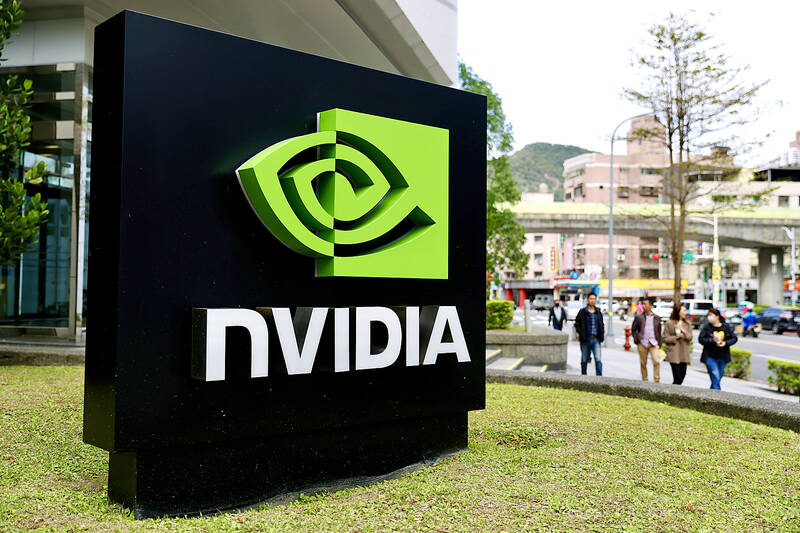Nvidia Corp’s first artificial intelligence (AI) research and development center in Asia, which is being built in Taiwan, is 40 percent complete, Department of Industrial Technology (DOIT) Director-General Chiou Chyou-huey (邱求慧) said.
The five-year project, which was started last year, seeks to hire 1,000 employees, build a supercomputer, named "Taipei-1," and work with Taiwan’s industry and research institutions to develop AI technologies and products, according to the Ministry of Economic Affairs.
Chiou told CNA that as the project enters its second year, up to 400 R&D-related employees have been employed.

Photo: EPA-EFE
On the hardware side, the installment of "Taipei-1" was completed at the end of last year, he said.
Asked about the supercomputer, Chiou said it consists of 64 Nvidia DGX H100, with each DGX H100 composing eight H100 graphic processing units (GPUs).
A GPU is a computer chip that has overtaken the traditional central processing unit (CPU) to become the most important computing technology in the AI era.
As of last year, H100 GPU was considered Nvidia’s most advanced — and the world’s most powerful GPU — powering Meta Platforms Inc and ChatGPT-maker OpenAI for generative AI training and inference.
The supercomputer also has 32 OVX computing systems, which are designed to build 3D virtual worlds and immersive digital twin simulations that have wide applications such as product development for manufacturing or better personalized care in healthcare.
As per the agreement with the ministry, a quarter of Taipei-1’s computing power will be provided to Taiwanese companies and research institutions to use for free for six weeks from July this year to February 2027 upon application, Chiou said.
He said the application, which closes at the end of this month, is open to all kinds of institutions, companies and start-ups for non-commercial use.
The supercomputer is situated in Kaohsiung, he added.
Meanwhile, Chiou denied a local report claiming a "second" R&D center is to be built.
"Nvidia’s R&D center is not one single building, so there is no question of a ’second’ one, as the company’s R&D projects are placed around the country," Chiou said.
According to the department’s Web site, Nvidia’s AI R&D center project was approved in December 2021, with the ministry providing a subsidy of NT$6.7 billion (US$206.7 million) and the company investing NT$17.6 billion.
Nvidia setting up its first AI R&D center in Asia in Taiwan is part of the government’s "Supreme A+ Program" — initiated in 2020 — to attract global pioneers in innovation to invest in state-of-the-art technologies in semiconductors, communications and AI in Taiwan.
US company Micron Technology Inc was granted a subsidy of NT$4.7 billion in 2021 under the same program for a project that focuses on developing advanced memory technologies.

GROWING OWINGS: While Luxembourg and China swapped the top three spots, the US continued to be the largest exposure for Taiwan for the 41st consecutive quarter The US remained the largest debtor nation to Taiwan’s banking sector for the 41st consecutive quarter at the end of September, after local banks’ exposure to the US market rose more than 2 percent from three months earlier, the central bank said. Exposure to the US increased to US$198.896 billion, up US$4.026 billion, or 2.07 percent, from US$194.87 billion in the previous quarter, data released by the central bank showed on Friday. Of the increase, about US$1.4 billion came from banks’ investments in securitized products and interbank loans in the US, while another US$2.6 billion stemmed from trust assets, including mutual funds,

AI TALENT: No financial details were released about the deal, in which top Groq executives, including its CEO, would join Nvidia to help advance the technology Nvidia Corp has agreed to a licensing deal with artificial intelligence (AI) start-up Groq, furthering its investments in companies connected to the AI boom and gaining the right to add a new type of technology to its products. The world’s largest publicly traded company has paid for the right to use Groq’s technology and is to integrate its chip design into future products. Some of the start-up’s executives are leaving to join Nvidia to help with that effort, the companies said. Groq would continue as an independent company with a new chief executive, it said on Wednesday in a post on its Web

JOINT EFFORTS: MediaTek would partner with Denso to develop custom chips to support the car-part specialist company’s driver-assist systems in an expanding market MediaTek Inc (聯發科), the world’s largest mobile phone chip designer, yesterday said it is working closely with Japan’s Denso Corp to build a custom automotive system-on-chip (SoC) solution tailored for advanced driver-assistance systems and cockpit systems, adding another customer to its new application-specific IC (ASIC) business. This effort merges Denso’s automotive-grade safety expertise and deep vehicle integration with MediaTek’s technologies cultivated through the development of Media- Tek’s Dimensity AX, leveraging efficient, high-performance SoCs and artificial intelligence (AI) capabilities to offer a scalable, production-ready platform for next-generation driver assistance, the company said in a statement yesterday. “Through this collaboration, we are bringing two

Even as the US is embarked on a bitter rivalry with China over the deployment of artificial intelligence (AI), Chinese technology is quietly making inroads into the US market. Despite considerable geopolitical tensions, Chinese open-source AI models are winning over a growing number of programmers and companies in the US. These are different from the closed generative AI models that have become household names — ChatGPT-maker OpenAI or Google’s Gemini — whose inner workings are fiercely protected. In contrast, “open” models offered by many Chinese rivals, from Alibaba (阿里巴巴) to DeepSeek (深度求索), allow programmers to customize parts of the software to suit their